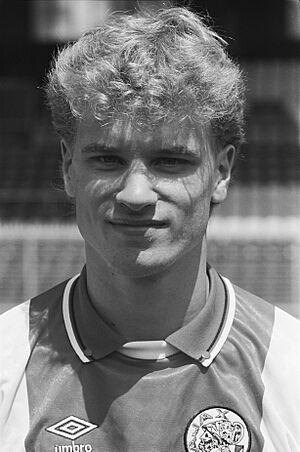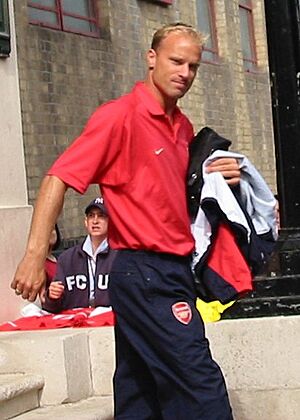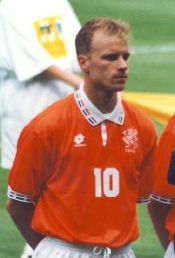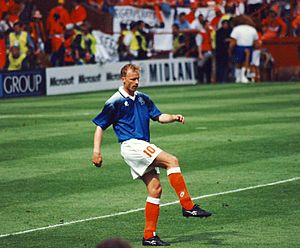Dennis Bergkamp facts for kids
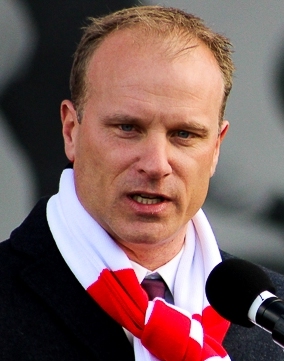
Bergkamp at the unveiling of his statue at the Emirates Stadium in 2014
|
|||
| Personal information | |||
|---|---|---|---|
| Full name | Dennis Nicolaas Maria Bergkamp | ||
| Date of birth | 10 May 1969 | ||
| Place of birth | Amsterdam, Netherlands | ||
| Height | 1.83 m (6 ft 0 in) | ||
| Position(s) | Forward, attacking midfielder | ||
| Youth career | |||
| 1981–1986 | Ajax | ||
| Senior career* | |||
| Years | Team | Apps | (Gls) |
| 1986–1993 | Ajax | 185 | (103) |
| 1993–1995 | Inter Milan | 52 | (11) |
| 1995–2006 | Arsenal | 315 | (87) |
| Total | 552 | (201) | |
| International career | |||
| 1989 | Netherlands U21 | 2 | (0) |
| 1990–2000 | Netherlands | 79 | (37) |
| Managerial career | |||
| 2011–2017 | Ajax (assistant) | ||
| *Club domestic league appearances and goals | |||
Dennis Bergkamp (born 10 May 1969) is a famous Dutch football coach and former player. He was known for being a forward and attacking midfielder. Many people consider him one of the best players of his time. He is also seen as one of the greatest players for both Ajax and Arsenal.
Bergkamp grew up in Amsterdam and started playing football as a child. He joined the famous Ajax youth system at age 11. He made his professional debut in 1986. His amazing skills quickly led him to play for the Netherlands in 1990. This caught the eye of many big European clubs.
In 1993, Bergkamp moved to the Italian club Inter Milan. After two seasons there, he joined Arsenal in 1995. At Arsenal, he became a legend. He helped the club win three Premier League titles, including one where they went unbeaten. He also won three FA Cup trophies. After retiring as a player, Bergkamp worked as an assistant coach at Ajax from 2011 to 2017.
For the Netherlands national team, Bergkamp played in Euro 1992 and scored three goals. At the 1998 FIFA World Cup, he scored an incredible winning goal against Argentina. This goal is still remembered as one of the greatest in World Cup history. He became the country's top scorer in 1998, a record later broken by other great players.
Experts often praise Bergkamp's amazing football skills. He was chosen by Pelé as one of the FIFA 100 greatest living players. In 2007, he was added to the English Football Hall of Fame. In 2021, he joined the Premier League Hall of Fame. His goal against Newcastle United in 2002 was voted the best Premier League goal ever.
Contents
Early Life and Football Dreams
Dennis Bergkamp was born in Amsterdam. He was the youngest of four sons. His father, an electrician, named him after Scottish football star Denis Law. An extra "n" was added to his name to follow Dutch naming rules.
Bergkamp grew up in a working-class area. He was raised as a Roman Catholic. As a child, his football heroes were Glenn Hoddle and Johan Cruyff. Cruyff even coached him when he was twelve years old.
Club Career Highlights
Ajax: Early Success
Bergkamp joined the Ajax youth system when he was 11. He made his first professional appearance on 14 December 1986. Ajax won that match 2–0. He scored his first goal for the club in February 1987.
In the following years, Bergkamp became a key player for Ajax. The club won the Eredivisie title in the 1989–90 season. This was their first league title in five years. Bergkamp scored 29 goals in 36 matches the next season. He was the top scorer in the league.
Ajax also won the 1992 UEFA Cup Final and the KNVB Cup in 1993. Bergkamp was the top scorer in the Eredivisie from 1991 to 1993. He was also named Dutch Footballer of the Year in 1992 and 1993. Overall, he scored 122 goals in 239 games for Ajax.
Inter Milan: A New Challenge
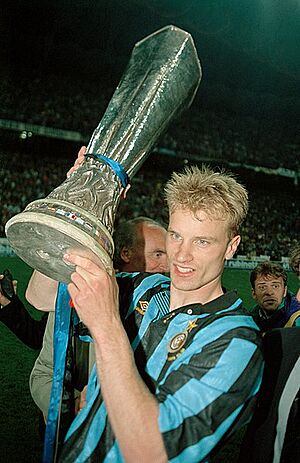
Bergkamp's great performances at Ajax attracted many European clubs. He decided to move to Italy, joining Inter Milan in 1993 for about £7.1 million. He felt Serie A was "the biggest league at the time."
He played his first game for Inter in August 1993. He scored his first goal in September. However, he found it tough against the strong Italian defenses. Inter had a difficult league season, finishing 13th. But they did win the UEFA Cup. Bergkamp was the top scorer in that competition with eight goals.
His second season at Inter was also challenging. He struggled with injuries and tiredness from the 1994 FIFA World Cup. He scored only 5 goals in 26 games. His quiet personality was sometimes misunderstood by the Italian press and fans. Inter finished sixth in the league that season.
Arsenal: Becoming a Legend
In June 1995, Bergkamp left Inter and joined Arsenal for around £7.5 million. He was the first big signing for manager Bruce Rioch. His arrival was important because he was a top international player. He also brought a new, more attacking style to Arsenal.
He made his debut in August 1995. At first, he found it hard to get used to English football. He didn't score in his first six league games. But on 23 September 1995, he scored his first two goals for Arsenal. He finished his first season with 11 goals in 33 games.
The arrival of Arsène Wenger as Arsenal manager in September 1996 changed everything for Bergkamp. Wenger saw his talent and wanted him to be the main creative player. Both believed in attacking football. Bergkamp became even more important to the team.
In the 1997–98 season, Bergkamp was key to Arsenal winning both the league and the FA Cup. He was the club's top scorer with 22 goals. He scored his first hat-trick for Arsenal against Leicester City. His third goal in that game was amazing. He controlled the ball, flicked it past a defender, and then scored.
In April 1998, he won the PFA Players' Player of the Year award. He was only the third non-British player to win this award.
The 1998–99 season was also very good for Bergkamp. Arsenal finished second in the league. He was the club's second-highest scorer with 16 goals. He also had the most assists in the Premier League. In an FA Cup semi-final against Manchester United, he missed a penalty. After that, he never took another penalty in his career.
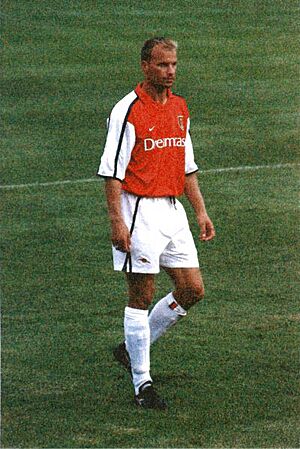
The 1999–2000 season was frustrating. Arsenal finished second in the league and lost the 2000 UEFA Cup Final. But Bergkamp signed a new contract in December 2000.
Success returned in the 2001–02 season. Arsenal won the league and the FA Cup again. Bergkamp played in 33 league matches and set up 15 goals. He scored a famous goal against Newcastle United in March 2002. He flicked the ball around a defender and then scored. Manager Wenger called it "unbelievable."
In the 2002–03 season, Bergkamp scored his 100th goal for Arsenal. Arsenal won the FA Cup for the second year in a row. In July 2003, he signed a new contract.
The 2003–04 season was historic. Arsenal won the league title without losing a single game. They were called "The Invincibles." Bergkamp helped set up the winning goal in the final league match.
In his final season at Arsenal, the team finished fourth. Bergkamp scored a late winning goal against Thun in the Champions League. Arsenal fans celebrated "Bergkamp Day" on 15 April 2006. This day honored his contributions to the club. His last goal for Arsenal was in this match. He was an unused substitute in his final game, the 2006 UEFA Champions League Final.
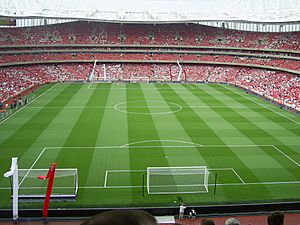
On 22 July 2006, a special match was played in his honor at Arsenal's new stadium, the Emirates Stadium. Arsenal played his old club Ajax. Many famous former players from both teams took part. Arsenal won the match 2–1.
International Career for the Netherlands
Bergkamp first played for the Netherlands national team on 26 September 1990. He scored his first international goal in November 1990.
He played in Euro 1992 and scored three goals. The Netherlands reached the semi-finals but lost on penalties. Bergkamp was named in the Team of the Tournament.
At the 1994 FIFA World Cup, Bergkamp scored against Morocco and the Republic of Ireland. He also scored against Brazil in the quarter-finals, but the Netherlands lost 3–2.
In 1998 World Cup qualification, he scored his first international hat-trick against Wales. At the 1998 FIFA World Cup in France, Bergkamp scored three goals. His winning goal against Argentina in the quarter-final was amazing. He controlled a long pass, went past a defender, and scored with a perfect shot. This goal was his 36th for the national team, making him the record scorer at the time.
In the semi-finals, the Netherlands lost to Brazil on penalties. Bergkamp was part of the All-Star team for the tournament.
His final goal for the Netherlands was on 9 October 1999, against Brazil. He played in Euro 2000, where the Netherlands reached the semi-finals. After this tournament, Bergkamp retired from international football. He scored 37 goals in 79 appearances for his country.
Player Style and Skills
Bergkamp learned football through the Dutch "Total Football" style. This meant players learned to play in many different positions. He played in almost every position except goalkeeper. This helped him understand how defenders think.
At Arsenal, he formed great partnerships with other strikers like Ian Wright and Thierry Henry. He played in his favorite role as a creative second striker. He was known for his amazing first touch, dribbling skills, and vision. He loved to set up goals for his teammates more than scoring them himself.
Bergkamp was sometimes accused of diving or being aggressive. He said this aggression often came from frustration. He learned to be mentally tough during his time in Italy.
Awards and Recognition
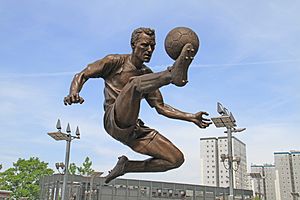
Dennis Bergkamp has received many awards. He finished third twice for the FIFA World Player of the Year award. He was also named in FIFA 100, a list of the 125 greatest living footballers chosen by Pelé.
He won Dutch Footballer of the Year twice and was the top scorer in the Eredivisie for three seasons. In England, he was named FWA Footballer of the Year and PFA Players' Player of the Year in 1998. His goals often won "Goal of the Season" awards.
In April 2007, he was inducted into the English Football Hall of Fame. In February 2014, Arsenal unveiled a statue of Bergkamp outside the Emirates Stadium. A statue of him will also be put up outside the KNVB headquarters in Zeist. This is because he was chosen as the best Dutch international player from 1990 to 2015.
Coaching Career
After retiring as a player, Bergkamp initially said he wouldn't become a coach. But in April 2008, he started a coaching course. He took on a trainee role at Ajax.
He became an assistant coach for the Netherlands B team in 2008. For the 2008–09 season, he returned to Ajax to coach the U12 youth team. In August 2011, he became assistant manager for the Ajax first team. He focused on training and helping young players join the main squad. He left his role at Ajax in December 2017.
Personal Life
Dennis Bergkamp married Henrita Ruizendaal on 16 June 1993. They have four children. His son Mitchel is also a footballer. His daughter is the partner of footballer Donny van de Beek.
His nephew, Roland Bergkamp, was also a professional footballer. Besides Dutch, Bergkamp speaks fluent English and Italian.
Fear of Flying
Bergkamp is known by the nickname "the Non-Flying Dutchman" because he has a fear of flying. This fear started during his first season at Inter Milan, when the team often traveled on small planes. He decided he would never fly again after the 1994 World Cup.
This condition meant he often could not play in away matches in European competitions. He would sometimes travel by car or train instead. However, for some matches, it was impossible for him to travel at all.
Career Statistics
Club
| Club | Season | League | National cup | League cup | Europe | Other | Total | |||||||
|---|---|---|---|---|---|---|---|---|---|---|---|---|---|---|
| Division | Apps | Goals | Apps | Goals | Apps | Goals | Apps | Goals | Apps | Goals | Apps | Goals | ||
| Ajax | 1986–87 | Eredivisie | 14 | 2 | 5 | 0 | – | 4 | 0 | – | 23 | 2 | ||
| 1987–88 | Eredivisie | 25 | 5 | 1 | 0 | – | 6 | 1 | 2 | 0 | 34 | 6 | ||
| 1988–89 | Eredivisie | 30 | 13 | 3 | 3 | – | 1 | 0 | – | 34 | 16 | |||
| 1989–90 | Eredivisie | 25 | 8 | 2 | 1 | – | 1 | 0 | – | 28 | 9 | |||
| 1990–91 | Eredivisie | 33 | 25 | 3 | 1 | – | 0 | 0 | – | 36 | 26 | |||
| 1991–92 | Eredivisie | 30 | 24 | 3 | 0 | – | 11 | 6 | – | 44 | 30 | |||
| 1992–93 | Eredivisie | 28 | 26 | 4 | 4 | – | 8 | 3 | – | 40 | 33 | |||
| Total | 185 | 103 | 21 | 9 | – | 31 | 10 | 2 | 0 | 239 | 122 | |||
| Inter Milan | 1993–94 | Serie A | 31 | 8 | 6 | 2 | – | 11 | 8 | – | 48 | 18 | ||
| 1994–95 | Serie A | 21 | 3 | 3 | 0 | – | 2 | 1 | – | 26 | 4 | |||
| Total | 52 | 11 | 9 | 2 | – | 13 | 9 | – | 74 | 22 | ||||
| Arsenal | 1995–96 | Premier League | 33 | 11 | 1 | 0 | 7 | 5 | – | – | 41 | 16 | ||
| 1996–97 | Premier League | 29 | 12 | 2 | 1 | 2 | 1 | 1 | 0 | – | 34 | 14 | ||
| 1997–98 | Premier League | 28 | 16 | 7 | 3 | 4 | 2 | 1 | 1 | – | 40 | 22 | ||
| 1998–99 | Premier League | 29 | 12 | 6 | 3 | 1 | 0 | 3 | 1 | 1 | 0 | 40 | 16 | |
| 1999–2000 | Premier League | 28 | 6 | 0 | 0 | 0 | 0 | 11 | 4 | 0 | 0 | 39 | 10 | |
| 2000–01 | Premier League | 25 | 3 | 5 | 1 | 0 | 0 | 5 | 1 | – | 35 | 5 | ||
| 2001–02 | Premier League | 33 | 9 | 6 | 3 | 1 | 0 | 6 | 2 | – | 46 | 14 | ||
| 2002–03 | Premier League | 29 | 4 | 4 | 2 | 0 | 0 | 7 | 1 | 1 | 0 | 41 | 7 | |
| 2003–04 | Premier League | 28 | 4 | 3 | 1 | 0 | 0 | 6 | 0 | 1 | 0 | 38 | 5 | |
| 2004–05 | Premier League | 29 | 8 | 4 | 0 | 0 | 0 | 4 | 0 | 1 | 0 | 38 | 8 | |
| 2005–06 | Premier League | 24 | 2 | 1 | 0 | 1 | 0 | 4 | 1 | 1 | 0 | 31 | 3 | |
| Total | 315 | 87 | 39 | 14 | 16 | 8 | 48 | 11 | 5 | 0 | 423 | 120 | ||
| Career total | 552 | 201 | 69 | 25 | 16 | 8 | 92 | 30 | 7 | 0 | 736 | 264 | ||
International
| National team | Year | Apps | Goals |
|---|---|---|---|
| Netherlands | 1990 | 4 | 3 |
| 1991 | 5 | 2 | |
| 1992 | 11 | 7 | |
| 1993 | 6 | 4 | |
| 1994 | 11 | 6 | |
| 1995 | 5 | 1 | |
| 1996 | 10 | 6 | |
| 1997 | 5 | 4 | |
| 1998 | 9 | 3 | |
| 1999 | 5 | 1 | |
| 2000 | 8 | 0 | |
| Total | 79 | 37 | |
- Scores and results list Netherlands goal tally first, score column indicates score after each Bergkamp goal.
| No. | Date | Venue | Opponent | Score | Result | Competition |
|---|---|---|---|---|---|---|
| 1 | 21 November 1990 | De Kuip, Rotterdam, Netherlands | 1–0 | 2–0 | UEFA Euro 1992 qualifying | |
| 2 | 19 December 1990 | Ta' Qali Stadium, Ta' Qali, Malta | 5–0 | 8–0 | UEFA Euro 1992 qualifying | |
| 3 | 7–0 | |||||
| 4 | 11 September 1991 | Philips Stadion, Eindhoven, Netherlands | 1–1 | 1–1 | Friendly | |
| 5 | 4 December 1991 | Kaftanzoglio Stadium, Thessaloniki, Greece | 1–0 | 2–0 | UEFA Euro 1992 qualifying | |
| 6 | 27 May 1992 | Trendwork Arena, Sittard, Netherlands | 2–0 | 3–2 | Friendly | |
| 7 | 12 June 1992 | Ullevi, Gothenburg, Sweden | 1–0 | 1–0 | UEFA Euro 1992 | |
| 8 | 18 June 1992 | Ullevi, Gothenburg, Sweden | 3–1 | 3–1 | UEFA Euro 1992 | |
| 9 | 22 June 1992 | Ullevi, Gothenburg, Sweden | 1–1 | 2–2 | UEFA Euro 1992 | |
| 10 | 9 September 1992 | Philips Stadion, Eindhoven, Netherlands | 1–0 | 3–2 | Friendly | |
| 11 | 2–0 | |||||
| 12 | 23 September 1992 | Ullevaal, Oslo, Norway | 1–1 | 1–2 | 1994 FIFA World Cup qualification | |
| 13 | 28 April 1993 | Wembley Stadium, London, England | 1–2 | 2–2 | 1994 FIFA World Cup qualification | |
| 14 | 13 October 1993 | De Kuip, Rotterdam, Netherlands | 2–0 | 2–0 | 1994 FIFA World Cup qualification | |
| 15 | 17 November 1993 | Stadion Miejski, Poznań, Poland | 1–0 | 3–1 | 1994 FIFA World Cup qualification | |
| 16 | 2–1 | |||||
| 17 | 1 June 1994 | Philips Stadion, Eindhoven, Netherlands | 1–1 | 7–1 | Friendly | |
| 18 | 7–1 | |||||
| 19 | 12 June 1994 | Varsity Stadium, Toronto, Canada | 1–0 | 3–0 | Friendly | |
| 20 | 29 June 1994 | Citrus Bowl, Orlando, United States | 1–0 | 2–1 | 1994 FIFA World Cup | |
| 21 | 4 July 1994 | Citrus Bowl, Orlando, United States | 1–0 | 2–0 | 1994 FIFA World Cup | |
| 22 | 9 July 1994 | Cotton Bowl, Dallas, United States | 1–2 | 2–3 | 1994 FIFA World Cup | |
| 23 | 29 March 1995 | De Kuip, Rotterdam, Netherlands | 2–0 | 4–0 | UEFA Euro 1996 qualifying | |
| 24 | 4 June 1996 | De Kuip, Rotterdam, Netherlands | 1–1 | 3–1 | Friendly | |
| 25 | 13 June 1996 | Villa Park, Birmingham, England | 2–0 | 2–0 | UEFA Euro 1996 | |
| 26 | 9 November 1996 | Philips Stadion, Eindhoven, Netherlands | 1–0 | 7–1 | 1998 FIFA World Cup qualification | |
| 27 | 6–0 | |||||
| 28 | 7–1 | |||||
| 29 | 12 December 1996 | King Baudouin Stadium, Brussels, Belgium | 1–0 | 3–0 | 1998 FIFA World Cup qualification | |
| 30 | 26 February 1997 | Parc des Princes, Paris, France | 1–0 | 1–2 | Friendly | |
| 31 | 30 April 1997 | Stadio Olimpico, Serravalle, San Marino | 1–0 | 6–0 | 1998 FIFA World Cup qualification | |
| 32 | 6–0 | |||||
| 33 | 6 September 1997 | Amsterdam ArenA, Amsterdam, Netherlands | 3–1 | 3–1 | 1998 FIFA World Cup qualification | |
| 34 | 20 June 1998 | Stade Vélodrome, Marseille, France | 3–0 | 5–0 | 1998 FIFA World Cup | |
| 35 | 29 June 1998 | Stade de Toulouse, Toulouse, France | 1–0 | 2–1 | 1998 FIFA World Cup | |
| 36 | 4 July 1998 | Stade Vélodrome, Marseille, France | 2–1 | 2–1 | 1998 FIFA World Cup | |
| 37 | 9 October 1999 | Amsterdam Arena, Amsterdam, Netherlands | 1–0 | 2–2 | Friendly |
Honours and Trophies
Ajax
- Eredivisie: 1989–90
- KNVB Cup: 1986–87, 1992–93
- European Cup Winners' Cup: 1986–87; runner-up: 1987–88
- UEFA Cup: 1991–92
Inter Milan
- UEFA Cup: 1993–94
Arsenal
- Premier League: 1997–98, 2001–02, 2003–04
- FA Cup: 2001–02, 2002–03, 2004–05; runner-up: 2000–01
- FA Charity/Community Shield: 1998, 2002, 2004
- UEFA Champions League runner-up: 2005–06
- UEFA Cup runner-up: 1999–2000
Individual Awards
- Dutch Football Talent of the Year: 1990
- Dutch Footballer of the Year: 1991, 1992
- Eredivisie top scorer: 1990–91, 1991–92, 1992–93
- UEFA European Championship Team of the Tournament: 1992
- IFFHS World's Top Goal Scorer: 1992
- Ballon d'Or runner-up: 1993; third place: 1992
- FIFA World Player of the Year bronze award: 1993, 1997
- UEFA Cup top scorer: 1993–94
- Arsenal Player of the Season: 1996–97
- Most assists in the Premier League: 1998–99 (shared)
- Premier League Player of the Month: August 1997, September 1997, March 2002, February 2004
- PFA Team of the Year: 1997–98 Premier League
- FWA Footballer of the Year: 1997–98
- PFA Players' Player of the Year: 1997–98
- BBC Goal of the Season: 1997–98, 2001–02
- FIFA World Cup All-Star Team: 1998
- FIFA 100
- English Football Hall of Fame: 2007
- Premier League Hall of Fame: 2021
- FWA Tribute Award: 2025
See also
 In Spanish: Dennis Bergkamp para niños
In Spanish: Dennis Bergkamp para niños
 | Delilah Pierce |
 | Gordon Parks |
 | Augusta Savage |
 | Charles Ethan Porter |


